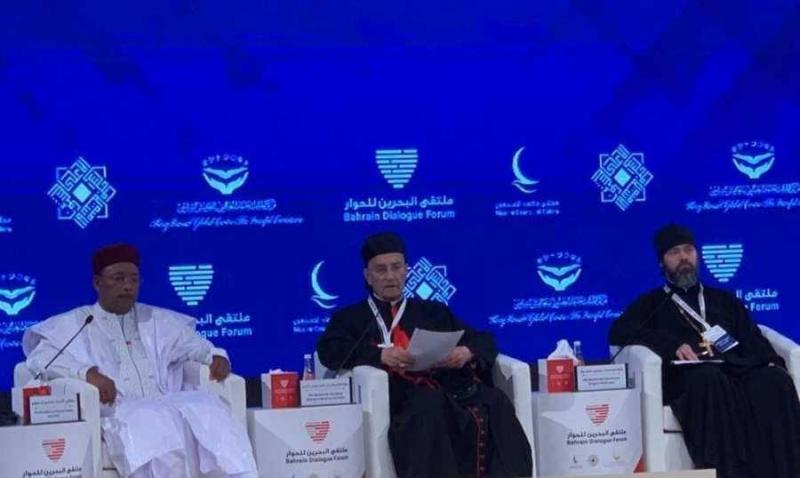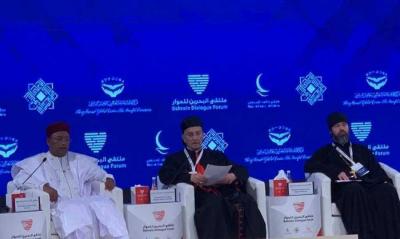Cardinal Patriarch Mar Bshara Peter Raï met with the King of Bahrain, Hamad bin Isa Al Khalifa, during the king's welcome to the heads of churches participating in the "Bahrain Dialogue Forum." Their discussion revolved around the situation in Lebanon. King Hamad emphasized his love and closeness to Lebanon and its people, expressing his sorrow for the current state of affairs there. He addressed Patriarch Raï, saying, "We follow your positions and words and see them as a significant benefit to Lebanon, a country whose current situation causes us a pain in the heart," affirming that "we Arabs will not abandon Lebanon, which we love dearly."
During his intervention at the "Bahrain Dialogue Conference," Raï stressed that "the presence of His Holiness Pope Francis and the Grand Imam Dr. Ahmad Al-Tayyeb, Sheikh of Al-Azhar, connects this forum to the Document on Human Fraternity for World Peace and Living Together they signed on February 4, 2019, in Abu Dhabi, and to the Encyclical of His Holiness Pope Francis titled 'Fratelli Tutti,' issued on October 3, 2020, which deepens what is presented in the 'document', starting from the fundamental principle that God 'created all human beings equal in rights, duties, and dignity, and called them to live as brothers among themselves to cultivate the earth and spread therein the values of goodness, love, and peace' (beginning of the document text; Fratelli Tutti, paragraph 5)."
Raï stated from Bahrain: "Human coexistence requires a commitment on international, regional, and internal levels, east and west, to put an end to the dangerous situations mentioned in the 'document,' such as 'religious and national extremism and fanaticism that has emerged in the world, whether in the West or the East, which we can call the beginnings of a 'Third World War in parts,' which has started to unveil its ugly face in many places, resulting in tragic situations where it is unknown, precisely, the number of those left as casualties, widows, and orphans. There are other places being prepared for further explosions and stockpiling of weapons and ammunition, all within a global context dominated by fogginess, disappointment, and fear for the future, where narrow material interests prevail."
He continued: "The massive political crises, injustice, and lack of fair distribution of natural resources, which are monopolized by a few wealthy individuals, depriving the vast majority of the earth's people, have resulted and continue to produce enormous numbers of the ill, the needy, and the dead, as well as deadly crises affecting many countries." Raï also highlighted that "Pope Francis, in his Encyclical 'Fratelli Tutti,' stated that dialogue between people of different religions for ensuring healthy human coexistence is not achieved through diplomacy and tolerance but through friendship and peace, sharing moral and spiritual values and practices in a spirit of truth and love, and by opening up to God, the Father of all, and consequently to universal brotherhood. All religions consider that every human person, whether male or female, is called to be God's son or daughter, and to act in this capacity. Thus, religions contribute greatly to building brotherhood and defending justice and human rights in society (see paragraphs 271 and 272). Pope Francis points out that among the most influential factors provoking crises in the contemporary world are: the numb conscience, the drifting away from religious values, the exacerbation of individualism and materialism, and the use of God's name for ideological and political purposes, thereby trampling on human dignity and violating its rights (see paragraphs 274-275)."
He added: "The experience of coexistence in Lebanon, from my perspective, depends on its political system, for we read in the preamble of the constitution: 'No authority is legitimate that contradicts what is coexistence among Christians and Muslims through mutual respect, ensuring the right of belief of each religion, its practices, and its traditions, and balanced participation in rights and duties, in governance and state management.' This daily dialogue between Muslims and Christians is based on three aspects: dialogue of life, dialogue of culture, and dialogue of destiny. This coexistence in Lebanon currently stumbles as the principle 'Lebanon is a final homeland for all its children,' as declared in the preamble of the constitution, has unfortunately not been accompanied by 'loyalty to Lebanon without others' in some of its people." It is noteworthy that coexistence is based on cultural and religious pluralism, recognized by the National Pact of 1943, and cemented by the Taif Agreement of 1989, becoming a core aspect of the Lebanese constitution.
Raï affirmed that "on the occasion of the International Day of Human Brotherhood on February 4, 2022, words were spoken that align with the theme of this forum. The UN Secretary-General Mr. António Guterres called for a stand against those who exploit differences, trade in hatred, and sow fear of 'the other' in fearful hearts, and to confront the rising rhetoric of hate, fanaticism, and discrimination, and the physical assault against individuals, solely because of their religion, beliefs, ethnicity, or sexual orientation. Mr. Miguel Moratinos, the representative of the Alliance of Civilizations, emphasized the importance of translating words into actions, calling for solidarity in building a better world within diverse cultures, but with one humanity. He emphasized that the path to the future begins with believing in human brotherhood. For the theme of the forum and its discussed dimensions not to remain within academic frameworks, it needs a spirit. This spirit is love and mercy, both a personal call for each of us."
He continued in his speech: "With love, you reflect the face of God, so do not distinguish between deserving and undeserving people, but treat them equally so that you can love and serve them. Our Lord Christ shared the table with tax collectors and sinners, and he did not reject the undeserving. Thus, he taught us not to reject anyone, for they are a brother to us who shares the same human nature. By our love, we can reform them. As for mercy, let its weight be in your balance, so you can feel within yourself that very mercy God has for the world in Himself. Through love and mercy, the human heart attains its depths and fills with compassion where it cannot bear to see any harm or suffering inflicted upon any creature. This boundless compassion is born in the human heart, making it akin to God (St. Isaac the Syrian)," emphasizing that "our world needs love and mercy as a path to human coexistence. I wish for this 'forum' complete success in its theme, along with abundant fruits."




